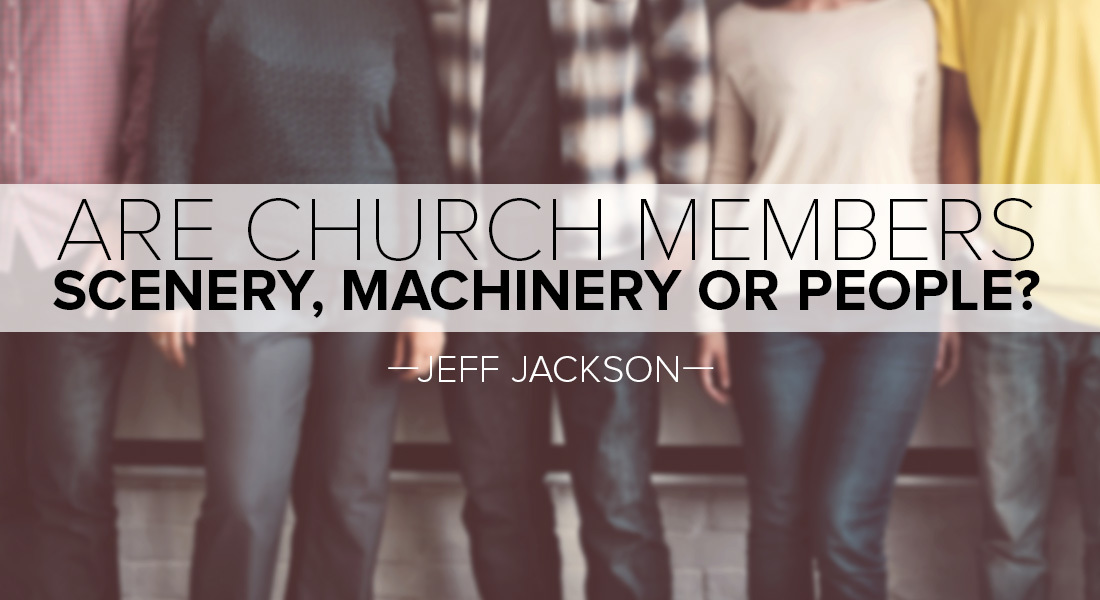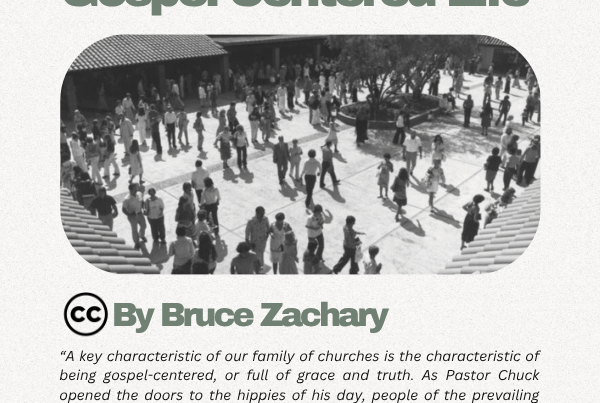
A number of years ago, an anthropologist from Poland, Alicja Iwanska, conducted a study among farmers in the Northwest section of the United States. One of the conclusions of the study found that within the realm of interaction with other people, these “average” Americans basically placed people into one of the following three categories: people, machinery or scenery.
A TRI-FOLD DESIGNATION OF OTHER PEOPLE
PEOPLE: were those that the study participants had “real” relationships with. This included immediate family members, close friends and a few others. They knew the “stories” of those they considered PEOPLE, shared their own story with them, and were genuinely concerned about what was going on in their lives.
MACHINERY: were those that they had the need to interact with as part of just living day-to-day life, and who usually were fulfilling some kind of function that the study participant needed in order to live life–like the teller at the bank, the gas station attendant, the waitress, the lady behind the counter at the DMV and so forth.
The service these people provided and that was needed by the study participant was all that mattered. There was no interest in showing any care for them, getting to know them at any level or revealing anything about themselves.
What mattered was whether this person accomplished the task that the study participant was deriving a benefit from. And if that task wasn’t accomplished to their satisfaction, then even less thought was given to that person, as a person, and a mental note was made to discover someone else who was more competent at completing the function.
SCENERY: were those who sporadically came within their field of vision at a distance, were from different cultures and/or from a lower socio-economic status.
The study participants knew they were out there and that they occupied space in the same little part of the world that they lived life in, but they didn’t have reason to interact with or engage them.
In many cases, they said that the distinction between these people and the actual scenery that surrounds day-to-day life such as trees, stoplights, billboards, fences, etc., had been blurred to them. Every now and then something would trigger a thought in them that forced them to recognize that these people really were people and not scenery, but that didn’t happen that often.
CATEGORIZATION IS COMMON TO ALL PEOPLE
In my own travels and ministry to Americans and those of other cultures, both here in America and in other countries, I’ve come to the conclusion that categorizing people like this is common among all people. In fact, I’m convinced that placing other people into one of these categories springs forth from two realities that are interwoven together.
First, it’s the result of our knowledge of our own limitations. We think we know our capacity for meaningful relationships, and once we have reached that number, we become comfortable with the idea of viewing those outside of that number as either machinery or scenery.
Second, that perceived limitation, under the control of the sinful, selfish nature that is our natural state, amplifies that perception of others. It provides a plausible explanation for our unwillingness to desire or to exert any effort to stop categorizing people and to start viewing others as we ourselves would like to be viewed by everyone else–as fellow human beings.
When these two realities are coupled together, it isn’t surprising to me that categorizing people in this way is the result.
IT’S NOT THE SYSTEM JESUS OR HIS KINGDOM USES
What is surprising to me is that this universal, sin-influenced way of viewing others continues to be the norm among those that are new creations in Christ–including those in local church leadership positions.
Jesus didn’t navigate life using the same categorization system of the people of His day, especially the one the religious leaders used. His interaction with everyone He came in contact with, and the truths He taught His followers about God’s love for all people, produced conflict with the religious leaders. And as the book of Acts and the epistles make clear, the world’s categorization system has no place in His Kingdom.
WHAT THE SYSTEM LOOKS LIKE IN A LOCAL CHURCH
And yet, whether they’re aware of it or not, many pastors and leaders of local churches view and interact with their attendees/members using the same categorization lenses as the study participants.
Which means:
1. They view the majority of the people sitting in the sanctuary at each service as nothing more than beautiful SCENERY that is to be enjoyed with their eyes alone. The gathered congregation is viewed in the same way a beautiful, hopefully ever expanding forest is–as something awesome to behold as a whole, with little regard for the health of the individual trees that actually produce the forest.
2. They view those that make the service run, (ushers, the audio & visual guys, parking lot attendants, even children’s ministry servants and so forth), as MACHINERY that is essential for the functioning of the various ministries of the church. They recognize that these servants do need attention on occasion, but the motivation for providing it is not from a genuine interest in them as people, but because they are crucial for the ongoing operation of the machine.
3. They only view their own families and fellow paid staff members as PEOPLE, and they are satisfied relating to the other members of the church as MACHINERY or SCENERY.
IS YOUR CHURCH USING IT?
If you’re a pastor or a church leader and you’ve just read the above and concluded that doesn’t describe your church, I’d like to challenge you to do something radical.
Why not ask four or five of those you interact with as PEOPLE, (not just paid staff, but others who serve in some capacity in the church on a regular basis) whether they feel like they’re treated as people, machinery or scenery by the pastor and leaders of the church?
And then humbly accept their perspective as valid–even if it is different from your own perspective–and then respond accordingly.









